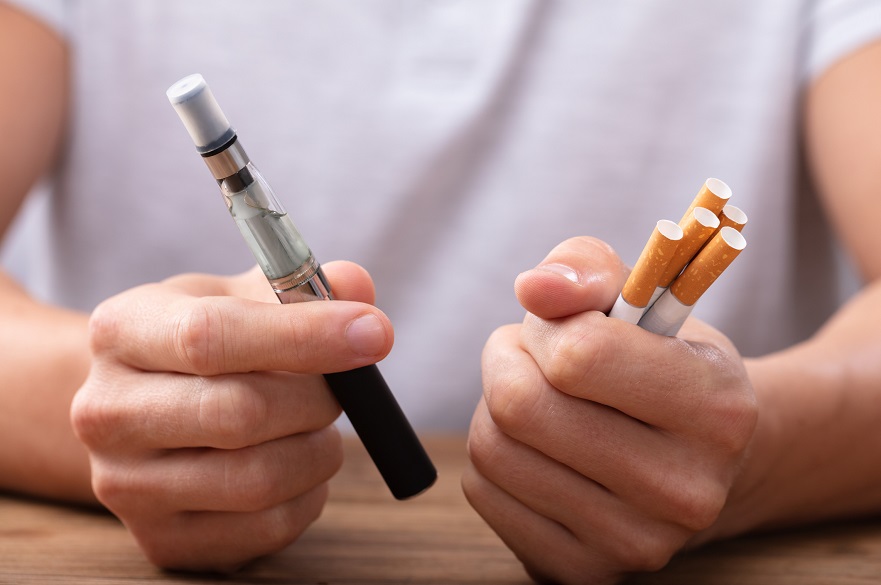Exposure to smoking and vaping in films increases uptake in young people – new study
Smoking and vaping content in films is contributing to the uptake of smoking and vaping by young people, according to research which found that regular exposure to smoking on screen could increase adolescent uptake by around 40% and exposure to vaping by around 30%.
By Helen Breese | Published on 3 May 2022
Categories: Press office; Research; School of Social Sciences;

Researchers from Nottingham Trent University (NTU) and the University of Nottingham reviewed 26 studies which reported the association between exposure to smoking or vaping in films and smoking or vaping uptake in adolescents.
The review combined data from a number of studies to produce an estimate of the likelihood of smoking or vaping after seeing this content in films.
The findings update a previous research review by the same team and continues to show that children exposed to high levels of smoking imagery were found to be around 40% more likely to become smokers than those unexposed or exposed to the lowest levels of content. The latest review also included studies looking at vaping and showed that children exposed to high levels of vaping were around 30% more likely to become vapers.
The study, led by Zeinab Hassanein, a PhD student at the School of Medicine, University of Nottingham, with Dr Alex Barker, lecturer in Psychology at NTU’s School of Social Sciences, highlights that current British Board of Film Classification (BBFC) guidelines do not go far enough. In content which appeals to children, smoking is only considered alongside age-classification based on promotion or glamorisation. There are currently no classifications guidelines in relation to vaping.
Zeinab Hassanein said: “Our study shows that smoking and vaping imagery has the potential to lead to uptake, and by not including smoking or vaping imagery in its classification guidelines, the BBFC is not delivering on its mission to protect children from this form of harmful imagery. We recommend that all films containing smoking and vaping imagery should be assigned an adult (+18) rating to protect children from the content.”
Dr Alex Barker and Zeinab Hassanein explain the findings
The paper also recommends that countries all over the world should have a well-designed board which is responsible for age classification ratings for movies and include vaping, as well as smoking, imagery in its classification guidelines. The work of the boards should also be broadened to include TV and other forms of media which are growing in popularity among young people.
The research concludes that exposure to this content in films can have an effect on uptake and questions the role of new media such as video on-demand, online video channels and social media, which is not subject to regulations on images of smoking on screen in the same way as traditional TV and film productions.
Dr Barker said: “Viewing habits are changing and new forms of visual media are becoming more popular, especially with young people. These services are often unregulated or subject to different regulations than UK films or TV. The current study shows that exposure to this content can lead to uptake and since our previous research has shown that smoking imagery remains prevalent in this media accessed by children and young people, this likely represents a continuing major and completely avoidable influence on smoking uptake.”
The paper Impact of smoking and vaping in films on smoking and vaping uptake in adolescents: systematic review and meta-analysis has been published in the journal Health Education and Behavior.
Notes for Editors
Press enquiries please contact Helen Breese, Public Relations Manager, on telephone +44 (0)115 848 8751, or via email.
About Nottingham Trent University
Nottingham Trent University (NTU) received the Queens Anniversary Prize for Higher and Further Education in 2021 for cultural heritage science research. It is the second time that NTU has been bestowed the honour of receiving a Queen’s Anniversary Prize for its research, the first being in 2015 for leading-edge research on the safety and security of global citizens.
NTU was awarded Outstanding Support for Students 2020 (Times Higher Education Awards). It was the University of the Year 2019 (Guardian University Awards, UK Social Mobility Awards), Modern University of the Year 2018 (Times and Sunday Times Good University Guide) and University of the Year 2017 (Times Higher Education Awards).
NTU is one of the UK’s largest universities, with over 33,000 students and more than 4,000 staff located across five campuses. It has an international student population of 4,000 and an NTU community representing around 160 countries.
In the past 15 years, NTU has invested £450 million in tools, technology and facilities.
NTU is in the UK’s top 10 for number of applications and ranked first for accepted offers (2019 UCAS UG acceptance data) It is also among the UK’s top five recruiters of students from disadvantaged backgrounds.
75% of NTU students go on to graduate-level employment or graduate-entry education / training within fifteen months of graduating (Guardian University Guide 2021).
NTU is 4th globally (and 3rd in the UK) for sustainability in the 2021 UI Green Metric University World Rankings (out of more than 900 participating universities).